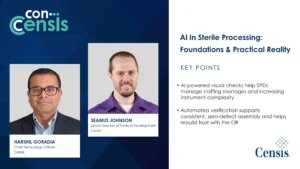How Cardiology Advances Help Hospital Operations
This week on the I Don’t Care Podcast, Kevin Stevenson welcomed Cardiovascular specialist Paula Reisdorfer to discuss advancements in Cardiovascular outpatient procedures. Paula started in the medical field volunteering as a candy striper volunteer at a local hospital. In the last 15 years, she has worked in outpatient imaging and surgery, specifically focusing on cardiovascular advancements. Heart disease is the number one cause of death in United States and there are more cardiovascular tools becoming available every day.
Cardiac care has always been a hospital-centric treatment. Due to advancements, treatments can be done quickly through careful patient selection. Outpatient strategy for cardiovascular care has been essential, especially during the COVID-19 pandemic. Maintenance heart care is not elective, and quick on-site service can reduce negligence on the patient side. Many patients avoid care because of pandemic fear and financial restraints for long hospital stays. Kevin and Paula encourage all patients to get the care they need, as hospitals are following every safety precaution, and many offer these quick outpatient procedures.
Unfortunately, many states require hospitals to provide Certificates of Need in order to introduce new treatments. It can often create barriers to get essential care in smaller communities. Discuss with your doctor which cardiovascular treatments would be best practice and additionally, which ones are available locally.
Cardiologists and other specialists are being employed by hospitals and healthcare systems in order to create loyalty. Hospitals require a sense of security that a cardiologist will be present for all times for patients in need. Less patients need to stay in-hospital because procedures are becoming outpatient. In return, hospitals have more capacity for high-priority patients and have the potential for better care.
Advancements in cardiology have reduced the prices of heart treatments. The technology advancements include radial access (access heart through the wrist instead of the groin or open-heart surgery), Leadless Cardiac Devices, and wearable EKG applications such as Apple Watches. The Leadless Cardiac Devices are the size of a AAA battery and implanted through the groin. The tissue naturally grows around the devices and can last up to 20 years. These Leadless Cardiac Devices are often Bluetooth enabled and allow physicians to receive real time data. Lastly, Paula shared that many tech companies, such as Apple, are creating EKG applications that are wearable outside of the body. Not only is this a non-invasive way to track one’s heart health, but it is providing a wealth of data for the cardiovascular community.
Medicare and commercial insurance are excited that patients are able to receive high quality care for a smaller cost. Open heart surgery is becoming less popular as more access points to the heart become available. Hospital leadership sees cardiology advancements as an opportunity for higher net revenue. Quicker, outpatient surgeries allow more patients to have access to treatments they need at a lower cost. These procedures also allow for more bed space for patients that need longer recoveries.
Overall, the cardiology field is growing rapidly, and new advancements are saving countless lives. Paula and Kevin shared their excitement over new technology and endless opportunities for accessible health for all. To learn more about medical advancements, tune in weekly to the I Don’t Care podcast.










